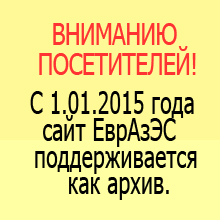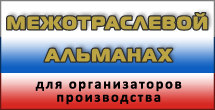|
TREATY TREATY on the Establishment of the Eurasian Economic Community1 TREATY on the Establishment of the Eurasian Economic Community1 (as amended on 25 January 2006 and 6 October 2007)
The Republic of Belarus, the Republic of Kazakhstan, the Kyrgyz Republic, the Russian Federation, the Republic of Tajikistan and the Republic of Uzbekistan, hereinafter referred to as the Contracting Parties, Endeavor to ensure their dynamic development by coordinating the socio-economic transformations in progress and by making effective use of economic potential to improve the living standards of their peoples; Determining to render their cooperation more effective in order to develop the processes of integration among them, and to intensify mutual cooperation in various fields; Recognizing the need to coordinate their approaches to integration into the global economy and the international trading system; Declaring their willingness to comply fully with their obligations under the Agreement on a customs union between the Russian Federation and the Republic of Belarus of 6 January 1995, the Agreement on a customs union of 20 January 1995, the Treaty on increased integration in the economic and humanitarian fields of 29 March 1996, and the Treaty on a customs union and a single economic space of 26 February 1999; Reaffirming their commitment to the principles of the Charter of the United Nations and to the generally accepted principles and rules of international law, Have agreed as follows:
Article 1 Establishment of an international organization
The Contracting Parties hereby establish an international organization, the Eurasian Economic Community (hereinafter referred to as EurAsEC, or the Community). EurAsEC shall have the powers voluntarily conferred on it by the Contracting Parties under this Treaty. The Contracting Parties shall remain sovereign and equal subjects of international law. Article 2 Objectives and purposes
EurAsEC is established in order to effectively advance the process of the formation by the Contracting Parties of a customs union and a single economic space, and to achieve the other objectives and purposes laid down in the Agreements referred to above, concerning the customs union, the Treaty on increased integration in the economic and humanitarian fields and the Treaty on a customs union and a single economic space, in accordance with the phases outlined in those instruments. Agreements concluded earlier between the Contracting Parties and the decisions of the integration management organs shall continue to have effect unless they are contrary to this Treaty.
Article 3 Organs
To ensure the continuity of the integration management organs established earlier by the Contracting Parties, the following shall be the organs responsible for implementing the objectives and purposes of this Treaty within the framework of EurAsEC: the Interstate Council; the Integration Committee; the Interparliamentary Assembly; the The Interstate Council shall decide on discontinuance of the activities of the integration management organs established by the Treaty on increased integration in the economic and humanitarian fields of 29 March 1996, and the Treaty on a customs union and a single economic space of 26 February 1999.
Article 4 Chairmanship
Chairmanship of the Interstate Council and the Integration Committee shall be assumed alternately by each member state of the Community, in Russian alphabetical order, for a term of one year. The procedure for determining the chairmanship of the other organs of the Community shall be governed by the relevant rules.
Article 5 The Interstate Council
The Interstate Council shall be the supreme organ of EurAsEC. It shall be composed of the Heads of State and the Heads of Government of the Contracting Parties. The Interstate Council shall consider questions of principle in the Community relating to the common interests of the member states. It shall decide on the strategy, means and prospects for integration development and shall take decisions for implementing the objectives and purposes of EurAsEC. The Interstate Council shall give instructions to the Integration Committee, submitting questions and recommendations to the Interparliamentary Assembly and queries to the Community Court. The Interstate Council may take decisions to establish subsidiary organs of the Community. The Interstate Council shall meet at the level of the Heads of State at least once a year and at the level of the Heads of Government at least twice a year. Meetings shall be presided over by a representative of the Contracting Party which holds the chairmanship of the Council. The functions and working arrangements of the Interstate Council shall be governed by Regulations approved by the Interstate Council at the level of the Heads of State of the EurAsEC member states. The Interstate Council shall be the supreme organ of the customs union. Resolutions on issues related to the customs union shall be taken by the members of the Interstate Council representing the Contracting Parties establishing the customs union. The specific procedure for operations of the Interstate Council as it performs the functions of the supreme organ of the customs union shall be governed by Regulations approved by the Interstate Council.
Article 6 Integration Committee
The Integration Committee shall be a standing organ of EurAsEC. 1. The main tasks of the Integration Committee shall be as follows: Ensuring cooperation between the organs of EurAsEC; Preparing proposals for the agenda of meetings of the Interstate Council and the level at which they are held, together with draft decisions and documents; Preparing proposals for drawing up the EurAsEC budget and monitoring its execution; Monitoring the implementation of decisions taken by the Interstate Council. For the purpose of fulfilling its tasks, the Integration Committee shall: Take decisions within the limits of its authority as defined by this Treaty and also as delegated to it by the Interstate Council; Submit to the Interstate Council on an annual basis a report on the situation in the Community and progress in the implementation of its objectives and purposes, a report on its activities and a performance report on the budget of EurAsEC; Consider measures designed to achieve the objectives of the Community, including the conclusion of relevant treaties and the conduct by the Contracting Parties of a single policy on specific issues, and prepare proposals accordingly; Have the right to submit recommendations to the Interstate Council, recommendations and queries to the Interparliamentary Assembly and the Governments of the Contracting Parties, and queries to the Community Court. 2. The Integration Committee shall be composed of the Deputy Heads of Government of the Contracting Parties. The Chairman of the Integration Committee shall participate in meetings of the Interstate Council. Meetings of the Integration Committee shall be held at least once every three months. In the interval between meetings of the Integration Committee, the routine work of the Community shall be carried out by the Commission of Permanent Representatives of the Contracting Parties to EurAsEC, appointed by the Heads of the member states. 3. The organization of work and the provision of information and technical support to the Interstate Council and the Integration Committee shall be the responsibility of the Secretariat of the Integration Committee (the Secretariat). The Secretariat shall be headed by a Secretary General, who shall be appointed by the Interstate Council on a proposal by the Integration Committee, to serve for a term of three years. The Secretary General shall be the chief administrative officer of the Community and shall participate in meetings of the Interstate Council and the Integration Committee. The Secretariat shall comprise nationals of the member states appointed on a quota basis to reflect the assessed contributions of the Contracting Parties to the budget of the Community, together with staff appointed on a contractual basis. In the performance of their duties, the Secretary General and the staff of the Secretariat shall not seek or accept instructions from any Contracting Party or from any authority outside the Community. They shall refrain from any acts which might reflect upon their position as international officials answerable only to EurAsEC. The Contracting Parties shall undertake to respect the international character of the duties of the Secretary General and the staff of the Secretariat, and shall not seek to exert any influence over them in the performance of their duties. The functions and working arrangements of the Integration Committee shall be determined by the Regulations adopted by the Interstate Council.
Article 7 The Interparliamentary Assembly
The Interparliamentary Assembly shall be the organ of parliamentary cooperation within the framework of EurAsEC. It shall deal with the issues of harmonization (bringing closer together, unification) of the national legislation of the Contracting Parties and the issues of bringing that legislation into conformity with treaties concluded within the framework of EurAsEC, with a view to achieving the objectives of the Community. The Interparliamentary Assembly shall be composed of members of parliament delegated by the parliaments of the Contracting Parties. The Interparliamentary Assembly, acting within the limits of its authority, shall: Draft the Fundamentals of legislation for examination by the Interstate Council in the basic areas of legal relations; Adopt model draft laws to serve as a basis for the drafting of national legislation; Be entitled to submit recommendations to the Interstate Council, queries and recommendations to the Integration Committee and the parliaments of the Contracting Parties, and queries to the Community Court. The Regulations governing the work of the Interparliamentary Assembly shall be approved by the Interstate Council.
Article 8 The Community Court
The Community Court shall ensure that this Treaty and other treaties in force in the Community framework as well as resolutions adopted by the organs of EurAsEC are applied by the Contracting Parties in a uniform manner. The Community Court shall also deal with disputes of an economic character arising between the Contracting Parties on matters relating to the implementation of resolutions of EurAsEC organs and the provisions of the treaties in force within the Community, and give interpretations and rulings on them. Upon integration of the customs territories of the Contracting Parties to the customs union, the Community Court shall: 1) consider the cases on conformity with the instruments of the customs union’s organs to international treaties forming the legal framework of the customs union; 2) consider the cases on disputing actions (inaction) of the customs union organs; 3) provide interpretation of international treaties forming the legal framework of the customs union, and regulations adopted by the customs union’s organs; 4) settle disputes between the customs union Commission and the member states of the customs union, as well as disputes between the member states of the customs union concerning fulfillment of their obligations undertaken within the customs union. Other disputes whose settlement is envisaged by EurAsEC international treaties can be considered by the Community Court. The Community Court shall be composed of representatives of the Contracting Parties, not more than two from each Contracting Party. The judges shall be appointed by the Interparliamentary Assembly on a proposal by the Interstate Council, to serve for a term of six years. Judges representing the Contracting Parties to the customs union shall participate in hearings of the cases based on application or interpretation of international treaties forming the legal framework of the customs union, regulations of the customs union organs, as well as cases on disputing resolutions, actions (inaction) of the customs union organs. The rules of procedure and hearings in the Community Court, the status of the Community Court judges and the working arrangements of the Community Court shall be determined in its Statute.
Article 9 Membership
Membership of EurAsEC shall be open to all States which accept the obligations arising from this Treaty and other treaties in force within the Community, according to a list determined by the Interstate Council, and which in the opinion of the members of EurAsEC have the capability and intention of fulfilling these obligations. Any Contracting Party may withdraw from membership in EurAsEC, provided that it has fulfilled its obligations to the Community and its members and has sent an official notification of its denunciation of this Treaty to the Integration Committee no later than twelve months prior to its withdrawal. Withdrawal will take effect during the current budget year if the notification was sent prior to the adoption of the budget for the subsequent budget year. If the notification is sent after adoption of the budget for the subsequent year, the withdrawal will take effect in the subsequent budget year. A Contracting Party in breach of the provisions of this Treaty and/or of treaties in force within the Community may be suspended, by a decision of the Interstate Council, from participation in the work of EurAsEC organs. If the Contracting Party continues to be in breach of its obligations, the Interstate Council may decide to exclude it from the Community from a date to be determined by the Council itself.
Article 10 Observers
Any State or international interstate (intergovernmental) organization may, on request, be granted observer status in EurAsEC. Resolutions whether to grant, suspend or cancel observer status shall be made by the Interstate Council.
Article 11 Legal capacity
EurAsEC shall, in the territory of each Contracting Party, have the necessary legal capacity to achieve its objectives and purposes. EurAsEC may enter into relations with States and international organizations, and conclude treaties with them. EurAsEC shall have the rights of a legal person for the achievement of its objectives and purposes, and inter alia has the right to: – conclude treaties; – acquire and dispose of property; – take part in court proceedings; – open accounts and perform transactions with monetary funds.
Article 12 Seat of international organs
The seat of the Integration Committee shall be the cities of Almaty (Republic of Kazakhstan) and Moscow (Russian Federation). The seat of the Interparliamentary Assembly shall be the city of St. Petersburg (Russian Federation). The seat of the Community Court shall be the city of Minsk (Republic of Belarus). Representations of the Integration Committee may be opened in the member states of the Community by a resolution of the Interstate Council.
Article 13 Procedure for the adoption of resolutions
1. The Interstate Council shall adopt all resolutions by consensus, according to the principle “consensus minus the vote of the interested Contracting Party”, except for resolutions on the suspension of membership or exclusion from the Community. Republic of Belarus – 15 votes Republic of Kazakhstan – 15 votes Kyrgyz Republic – 7.5 votes Russian Federation – 40 votes Republic of Tajikistan – 7.5 votes
Article 14 Execution of resolutions
Resolutions by the organs of EurAsEC shall be concluded by the Contracting Parties by adoption of the necessary national regulatory instruments, in accordance with national legislation. The organs of the Community shall, within the limits of their competence, monitor the performance by the Contracting Parties of their obligations in implementation of this Treaty and other treaties in force within the Community, and of resolutions by organs of EurAsEC. Article 15 Financing
1. The activities of EurAsEC organs shall be financed from the budget of the Community. The budget of the Community for each budget year shall be drawn up by the Secretariat of the EurAsEC Integration Committee by agreement with the member states, and shall be reviewed and adopted by the Interstate Council in the established order. The budget of the Community may not incur a deficit. 2. The budget of the Community shall be made up of the following: 1) assessed contributions of the Contracting Parties to finance the activities of EurAsEC organs, to finance the meetings of the Community organs and the Commission of Permanent Representatives within EurAsEC, according to the following scale: Republic of Belarus – 15 per cent Republic of Kazakhstan – 15 per cent Kyrgyz Republic – 7.5 per cent Russian Federation – 40 per cent Republic of Tajikistan – 7.5 per cent 2) contributions of the Contracting Parties to finance interstate target programs of EurAsEC and other events defined by decisions of the Interstate Council at a ratio corresponding to the Contracting Parties’ participation, in compliance with decisions of the Interstate Council for each program. 3. The budget funds shall be used: to finance activities of the organs of EurAsEC; to finance meetings of the Community organs and the Commission of Permanent Representatives within EurAsEC; for other purposes not contrary to the objectives and purposes of EurAsEC, upon approval of the Interstate Council. 4. If the amounts owed by any Contracting Party to the EurAsEC budget exceed a sum equivalent to its annual assessed contribution, the Interstate Council may decide to deprive it of voting rights in the Community organs until all dues have been paid in full. In that case the Contracting Party’s votes shall be distributed among the other Parties, in proportion to their contributions to the Community budget for financing EurAsEC organ activities and financing the meetings of Community organs and the Commission of Permanent Representatives within EurAsEC. Article 16 Privileges and immunities
The Community and its officials shall enjoy the privileges and immunities necessary for the exercise of their functions and the achievement of the purposes specified in this Treaty, and in treaties in force within the framework of EurAsEC. The range of privileges and immunities of the Community and its officials, the staff of the Secretariat and the representations of the Integration Committee, and also of the Permanent Representatives of the Contracting Parties to the Community shall be defined in separate instruments.
Article 17 Working language
The working language of EurAsEC shall be Russian.
Article 18 Period of validity and entry into force
This Treaty shall be concluded for an indefinite period. This Treaty shall be subject to ratification by the Contracting Parties, and shall come into force on the date when the last notification of completion of the internal procedures required for its coming into force is given to the depositary, which is the Integration Committee. The Parties shall, if necessary, bring their national legislation into conformity with the provisions of this Treaty.
Article 19 Amendments
Changes may be made to this Treaty by the Contracting Parties in the form of a separate protocol, which shall be an integral part of this Treaty.
Article 20 Registration
In accordance with article 102 of the Charter of the United Nations, this Treaty shall be registered with the Secretariat of the United Nations. Done at Astana on 10
October, The original text of the Treaty shall be deposited with the Integration Committee, which shall transmit a certified copy thereof to each Contracting Party.
For the Republic of Belarus A. Lukashenko For the Republic of Kazakhstan N. Nazarbayev For the Kyrgyz Republic A. Akayev For the Russian Federation V. Putin For the Republic of Tajikistan E. Rakhmonov
|
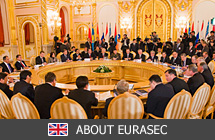
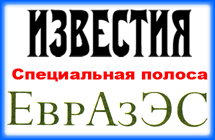
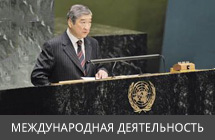
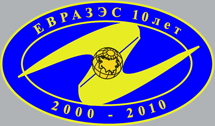
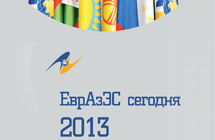
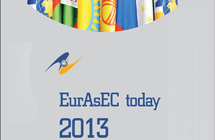
Поиск 10.10.2014 Заседание Межгосударственного совета ЕврАзЭС07.10.2014 Мультимедийная пресс-конференция в агентстве «Россия сегодня»03.10.2014 Встреча с Послом Финляндской Республики04.08.2014 Встреча Генерального секретаря ЕврАзЭС с Послом Республики Таджикистан20.06.2014 Премии Петербургского международного юридического форума «За вклад в развитие правовой интеграции на евразийском пространстве»28.05.2014 Договор о Евразийском экономическом союзе – важнейшее событие в новейшей истории наших стран25.05.2014 Презентация книги «Евразийский проект Нурсултана Назарбаева, воплощенный в жизнь. К 20-летию евразийского проекта 1994–2014»24.05.2014 VII АСТАНИНСКИЙ ЭКОНОМИЧЕСКИЙ ФОРУМ. Панельная сессия «Евразийской экономической интеграции – 20 лет. Итоги и перспективы»24.05.2014 VII Астанинский экономический форум и II Всемирная Антикризисная конференция, 21-23 мая 2014 года, Астана24.05.2014 Петербургский международный экономический форум, 23 – 24 мая 2014 года, Санкт-Петербург |

Евразийское экономическое сообщество
ЕврАзЭС
-
Страны участники
 Беларусь
Беларусь
-
 Казахстан
Казахстан
-
 Кыргызстан
Кыргызстан
-
 Россия
Россия
-
 Таджикистан
Таджикистан
-
 Узбекистан
Узбекистан
-
 Молдова
Молдова
-
 Украина
Украина



